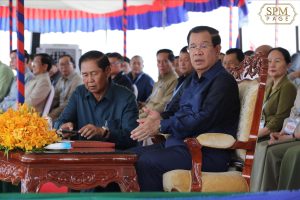Cambodian Prime Minister Hun Sen redeployed his military forces to the northeast frontier this week, ordering troops to shoot down unidentified drones seen flying over Ratanakkiri province that were apparently being used to make contact with “defectors” fleeing Vietnam.
Additionally Hun Sen offered a $200,000 bounty for any military unit that shoots down a drone, which he said – after checking with authorities in Hanoi – were not Vietnamese but linked to violent protests staged this month by Montagnards in the Central Highlands.
Subsequently, the autocratic leader, who will take his party to the polls in less than a month, has urged “every country to review the case of unidentified drones entering Cambodia which violated Cambodia’s independence and sovereignty.”
“I warn any country that use drones to invade Cambodia and carry out acts of terror on Cambodian soil. If we investigate and find out, we will file a complaint to the United Nations,” he told 20,000 factory workers in Phnom Penh as the drama was unfolding.
Unidentified drones were initially spotted in Ratanakkiri on Tuesday morning.
Hun Sen then ordered Defense Minister Tea Banh, Royal Cambodian Armed Forces Commander-in-Chief Vong Pisen, and Hing Bun Heang, the commander of the his personal bodyguard unit, into the area and to “take down the unidentified drones.”
Further sightings were made on Tuesday night to the south in Koh Nhek district of Mondulkiri province, resulting in a reward being posted and calls for people living in the area not to panic over troop mobilization.
State-run news outlets gave the story top billing.
According to the semi-official Fresh News portal, Hun Sen “highlighted the recent terrorist attacks in Vietnamese territory about two weeks ago” and added he was cooperating closely with Vietnam in preventing “terrorist groups from fleeing into Cambodian territory.”
A letter published by Cambodia New Vision quoted Hun Sen as saying “additional orders for the forces in the 1st military zone” were “to search for forces that ran from Vietnam through to hide in Cambodian territory.”
“I consider this to be an invasion and an attempt on terrorist activities on the Cambodian soil,” he said. “It is clear that the drones are seeking to make contacts with a group of defectors who have fled Vietnam, and may be in hiding in Cambodia.”
“We call on all countries that provide location and space for the unmanned aircrafts to enter our territory to immediately stop such acts of terrorist nature against the independence and sovereignty of the Kingdom of Cambodia,” he wrote.
The Montagnards, or Dega, are highland minority groups that fought alongside the United States and allied troops during the Vietnam War and have endured a difficult relationship with the communist government in Hanoi ever since.
Often, they have crossed the border into Cambodia in search of sanctuary during times of trouble – a potentially contentious issue ahead of the July 23 election.
On June 19, Hun Sen said he had expelled all Montagnards who sought refuge in Cambodia after violent clashes with Vietnamese security forces.
Sources that preferred to remain anonymous claimed those protests involved Dega people and had escalated into attacks on two police stations that left nine people dead. Montagnard support groups in the U.S. have rejected those allegations.
Vietnamese authorities claimed the attacks were orchestrated by terrorists and have so far detained 84 people and charged 75 with “conducting terrorist acts against the people’s government,” without mentioning their ethnic or tribal background.
In Cambodia, the political rhetoric has been nasty and recently ramped-up as Hun Sen’s long-ruling Cambodian People’s Party (CPP) prepares for a three week election campaign to begin on Saturday and a poll that only it can win, given a six-year crackdown on dissent.
Security seems to be a key plank.
Last Saturday, Hun Sen accused an unnamed opposition group of plotting to kidnap him, adding they were calling “on the armed forces to shoot at Hun Sen.” The prime minister also said he was prepared to sacrifice 100 to 200 people in order to maintain peace.
And NGOs, which formed the backbone of Cambodia’s early post-war reconstruction, have been told to submit to financial audits to ensure they are not “receiving funds from terrorist networks.”
Drones and troop redeployments to the Vietnamese border can only add to the sense of heightened security ahead of the Cambodian ballot and from an historical perspective that is not unusual.

































